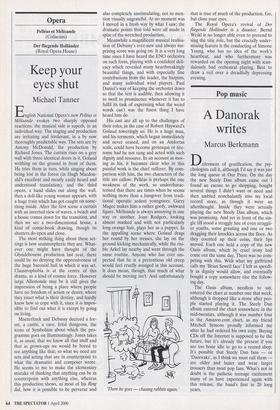Opera
Keep your eyes shut
Michael Tanner
English National Opera's new Pelleas et Melisande evokes two sharply opposed reactions: the musical side is superb, in an individual way. The staging and production are irritating and irrelevant, in a by now thoroughly predictable way. The sets are by Antony McDonald, the production by Richard Jones. The curtain rises on a grey wall with three identical doors in it, Golaud writhing on the ground in front of them. He tries them in turn, while singing about being lost in the forest (in Hugh Macdon- ald's excellent and mostly easily heard and understood translation), and the third opens, a hand slides out along the wall, then a doll-like young woman appears, with a huge train which has got caught on some- thing inside. After the first scene a curtain with an inverted view of waves, a beach and a house comes down for the transition, and then we see a two-dimensional house, a kind of comic-book drawing, though its shutters do open and close.
The most striking thing about these set- tings is how un atmospheric they are. What- ever one might have thought of the Glyndebourne production last year, there could be no denying the oppressiveness of the huge baronial hall in which it was set. Claustrophobia is at the centre of this drama, as a kind of cosmic force. However large Allemonde may be it still gives the impression of being a place where people have no freedom of action or desire, where they enact what is their destiny, and hardly know how to cope with it, since it is impos- sible to find out what it is except by going on living.
Maeterlinck and Debussy decreed a for- est, a castle, a cave, fetid dungeons, the icons of Symbolism about which the pro- gramme goes on illuminatingly. Jones takes it, as usual, that we know all that stuff and that as grown-ups we would be bored to see anything like that; so what we need are sets and acting that are in counterpoint to what the dramatist and composer wrote. He seems to me to make the elementary mistake of thinking that anything can be in counterpoint with anything else, whereas this production shows, as most of his Ring did, how it is possible to be perverse and also completely unstimulating, not to men- tion visually ungrateful. At no moment was I moved in a fresh way by what I saw; the dramatic points that told were all made in spite of the wretched production.
Meanwhile a magnificent musical realisa- tion of Debussy's ever-new and always sur- prising score was going on. It is a very long time since I have heard the ENO orchestra on such form, playing with a confident deli- cacy which revealed many heartbreakingly beautiful things, and with especially fine contributions from the leader, the harpists, and many individual wind players. Paul Daniel's way of keeping the orchestra down so that the text is audible, then allowing it to swell to prominence whenever it has to fulfil its task of expressing what the weird words can't was the finest thing I have heard him do.
His cast are all up to the challenges of their roles, in the case of Robert Hayward's Golaud toweringly so. He is a huge man, and his torments, which began immediately and never ceased, and on an Amfortas scale, could have become grotesque or tire- some had he not sung and acted with such dignity and resource. In an account as mov- ing as his, it becomes clear who in this painful work is the chief sufferer. By com- parison with him, the two characters of the title are callow: Pelleas is perhaps the one weakness of the work, so undercharac- terised that there are times when he seems nothing more than a hangover from tradi- tional operatic ardent youngsters. Garry Magee makes him a rather goofy, awkward figure. Melisande is always annoying in one way or another. Joan Rodgers, looking almost masked and with not particularly long orange hair, plays her as a puppet. In the appalling scene where Golaud drags her round by her tresses, she lay on the ground kicking mechanically, while the risi- ble Arkel lay nearby and went through the same routine. Anyone who has ever sus- pected that he is a pretentious old creep would feel cruelly avenged in this account. It does mean, though, that much of what should be moving isn't. And unfortunately `There he goes — chasing rabbits again.' that is true of much of the production. Go, but close your eyes.
The Royal Opera's revival of Der fliegende Hollander is a disaster. Bernd Weikl is no longer able even to pretend to sing the title role, but the crucially under- mining feature is the conducting of Simone Young, who has no idea of the work's heartbeat, and who furthermore was rewarded on the opening night with scan- dalously bad orchestral playing. Best to draw a veil over a dreadfully depressing evening.






















































































 Previous page
Previous page